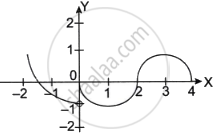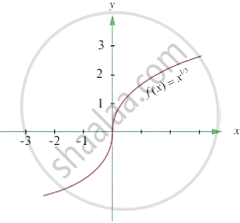Advertisements
Advertisements
Question
Is the function f defined by f(x)= `{(x, if x<=1),(5, if x > 1):}` continuous at x = 0? At x = 1? At x = 2?
Solution
`f (x) = {(x, if x<=1),(5, if x > 1):}`
(i) ⇒ x = 0 पर
`lim_(x -> 0^-) f (x) = lim_(h -> 0) f(0 - h)`
= 0 - 0
= 0
`lim_(x -> 0^+) f(x) = lim_(h -> 0) f(0 + h)`
= 0 + 0
= 0
f(0) = 0
(ii) Hence, f is continuous at x = 0.
⇒ at x = 1
`lim_(x -> 1)` f(x) = `lim_(h -> 1)` f (1 - h)
= 1 - 0
= 1
`lim_(x -> 1)` f(x) = 5
Hence f is not continuous at x = 1.
⇒ at x = 2
`lim_(x -> 2^-)` f(x) = `lim_(h -> 2^+)` f(x) = 5
f(2) = 5
Hence, f is continuous at x = 2.
APPEARS IN
RELATED QUESTIONS
Discuss the continuity of the following functions. If the function have a removable discontinuity, redefine the function so as to remove the discontinuity
`f(x)=(4^x-e^x)/(6^x-1)` for x ≠ 0
`=log(2/3) ` for x=0
Prove that the function f (x) = 5x – 3 is continuous at x = 0, at x = – 3 and at x = 5.
Find all points of discontinuity of f, where f is defined by `f(x) = {(|x|+3, if x<= -3),(-2x, if -3 < x < 3),(6x + 2, if x >= 3):}`
Find all points of discontinuity of f, where f is defined by `f (x) = {(x/|x|, if x<0),(-1, if x >= 0):}`
Find all points of discontinuity of f, where f is defined by `f (x) = {(x+1, if x>=1),(x^2+1, if x < 1):}`
Using mathematical induction prove that `d/(dx) (x^n) = nx^(n -1)` for all positive integers n.
Determine the value of the constant 'k' so that function f(x) `{((kx)/|x|, ","if x < 0),(3"," , if x >= 0):}` is continuous at x = 0
Find the value of constant ‘k’ so that the function f (x) defined as
f(x) = `{((x^2 -2x-3)/(x+1), x != -1),(k, x != -1):}`
is continous at x = -1
For what value of λ is the function
\[f\left( x \right) = \begin{cases}\lambda( x^2 - 2x), & \text{ if } x \leq 0 \\ 4x + 1 , & \text{ if } x > 0\end{cases}\]continuous at x = 0? What about continuity at x = ± 1?
Find the points of discontinuity, if any, of the following functions:
Find the points of discontinuity, if any, of the following functions: \[f\left( x \right) = \begin{cases}2x , & \text{ if } & x < 0 \\ 0 , & \text{ if } & 0 \leq x \leq 1 \\ 4x , & \text{ if } & x > 1\end{cases}\]
Discuss the Continuity of the F(X) at the Indicated Points : F(X) = | X − 1 | + | X + 1 | at X = −1, 1.
Find the point of discontinuity, if any, of the following function: \[f\left( x \right) = \begin{cases}\sin x - \cos x , & \text{ if } x \neq 0 \\ - 1 , & \text{ if } x = 0\end{cases}\]
Show that the function f given by:
`f(x)={((e^(1/x)-1)/(e^(1/x)+1),"if",x,!=,0),(-1,"if",x,=,0):}"`
is discontinuous at x = 0.
Find all points of discontinuity of the function f(t) = `1/("t"^2 + "t" - 2)`, where t = `1/(x - 1)`
The number of discontinuous functions y(x) on [-2, 2] satisfying x2 + y2 = 4 is ____________.
`lim_("x"-> 0) sqrt(1/2 (1 - "cos" 2"x"))/"x"` is equal to
The function f defined by `f(x) = {{:(x, "if" x ≤ 1),(5, "if" x > 1):}` discontinuous at x equal to
The point of discountinuity of the function `f(x) = {{:(2x + 3",", x ≤ 2),(2x - 3",", x > 2):}` is are
How many point of discontinuity for the following function for x ∈ R
`f(x) = {{:(x + 1",", if x ≥ 1),(x^2 + 1",", if x < 1):}`
`f(x) = {{:(x^3 - 3",", if x < 2),(x^2 + 1",", if x > 2):}` has how many point of discontinuity
Sin |x| is a continuous function for
If function f(x) = `{{:((asinx + btanx - 3x)/x^3,",", x ≠ 0),(0,",", x = 0):}` is continuous at x = 0 then (a2 + b2) is equal to ______.
If f(x) = `{{:(cos ((π(sqrt(1 + x) - 1))/x)/x,",", x ≠ 0),(π/k,",", x = 0):}`
is continuous at x = 0, then k2 is equal to ______.
If the function f defined as f(x) = `1/x - (k - 1)/(e^(2x) - 1)` x ≠ 0, is continuous at x = 0, then the ordered pair (k, f(0)) is equal to ______.
Find the value(s) of 'λ' if the function
f(x) = `{{:((sin^2 λx)/x^2",", if x ≠ 0 "is continuous at" x = 0.),(1",", if x = 0):}`
Find the value of k for which the function f given as
f(x) =`{{:((1 - cosx)/(2x^2)",", if x ≠ 0),( k",", if x = 0 ):}`
is continuous at x = 0.
The graph of the function f is shown below.

Of the following options, at what values of x is the function f NOT differentiable?
Consider the graph `y = x^(1/3)`

Statement 1: The above graph is continuous at x = 0
Statement 2: The above graph is differentiable at x = 0
Which of the following is correct?
